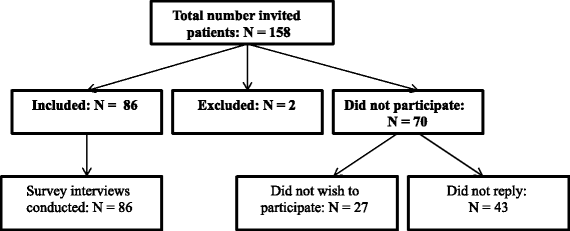Unmet needs for healthcare and social support services in patients with Huntington's disease: a cross-sectional population-based study
- PMID: 26411462
- PMCID: PMC4585992
- DOI: 10.1186/s13023-015-0324-8
Unmet needs for healthcare and social support services in patients with Huntington's disease: a cross-sectional population-based study
Abstract
Background: In order to plan and improve provision of comprehensive care in Huntington's disease (HD), it is critical to understand the gaps in healthcare and social support services provided to HD patients. Research has described utilization of healthcare services in HD in Europe, however, studies systematically examining needs for healthcare services and social support are lacking. This study aims to identify the level and type of met and unmet needs for health and social care services among patients with HD, and explore associated clinical and socio-demographic factors.
Methods: Eighty-six patients with a clinical diagnosis of HD living in the South-Eastern region of Norway were recruited. Socio-demographic and clinical characteristics were collected. The Needs and Provision Complexity Scale (NPCS) was used to assess the patients' needs for healthcare and social services. Functional ability and disease stage was assessed using the UHDRS Functional assessment scales. In order to investigate factors determining the level of total unmet needs and the level of unmet needs for Health and personal care and Social care and support services, multivariate logistic regression models were used.
Results: A high level of unmet needs for health and personal care and social support services were found across all five disease stages, but most marked in disease stage III. The middle phase (disease stage III) and advanced phase (disease stages IV and V) of HD increased odds of having a high level of total unmet needs by 3.5 times and 1.4 times respectively, compared with the early phase (disease stages I and II). Similar results were found for level of unmet needs in the domain Health and personal care. Higher education tended to decrease odds of high level of unmet needs in this domain (OR = 0.48) and increase odds of higher level of unmet needs in the domain of Social care and support (OR = 1.3). Patients reporting needs on their own tended to decrease odds of having unmet needs in Health and personal care (OR = 0.57).
Conclusions: Needs for healthcare and social services in patients with HD should be assessed in a systematic manner, in order to provide adequate comprehensive care during the course of disease.
Figures
Similar articles
-
Health-related quality of life and unmet healthcare needs in Huntington's disease.Health Qual Life Outcomes. 2017 Jan 7;15(1):6. doi: 10.1186/s12955-016-0575-7. Health Qual Life Outcomes. 2017. PMID: 28069034 Free PMC article.
-
Balancing needs as a family caregiver in Huntington's disease: a qualitative interview study.Health Soc Care Community. 2015 Sep;23(5):569-76. doi: 10.1111/hsc.12174. Epub 2014 Dec 4. Health Soc Care Community. 2015. PMID: 25471490
-
Predictors of unmet health care needs in Serbia; Analysis based on EU-SILC data.PLoS One. 2017 Nov 8;12(11):e0187866. doi: 10.1371/journal.pone.0187866. eCollection 2017. PLoS One. 2017. PMID: 29117216 Free PMC article.
-
Palliative care provision in Huntington's disease.Int J Palliat Nurs. 2007 Mar;13(3):125-30. doi: 10.12968/ijpn.2007.13.3.23274. Int J Palliat Nurs. 2007. PMID: 17505405 Review.
-
Unmet needs for social support and effects on diabetes self-care activities in Korean Americans with type 2 diabetes.Diabetes Educ. 2012 Jan-Feb;38(1):77-85. doi: 10.1177/0145721711432456. Epub 2012 Jan 5. Diabetes Educ. 2012. PMID: 22222514 Free PMC article. Review.
Cited by
-
Scleroderma Patient-centered Intervention Network-Scleroderma Support group Leader EDucation (SPIN-SSLED) program: non-randomised feasibility trial.BMJ Open. 2019 Nov 11;9(11):e029935. doi: 10.1136/bmjopen-2019-029935. BMJ Open. 2019. PMID: 31719073 Free PMC article.
-
Primary health care professionals' experiences with caring for patients with advanced Huntington's disease: a qualitative study.BMC Prim Care. 2024 May 7;25(1):155. doi: 10.1186/s12875-024-02408-2. BMC Prim Care. 2024. PMID: 38714964 Free PMC article.
-
Public and patient involvement in needs assessment and social innovation: a people-centred approach to care and research for congenital disorders of glycosylation.BMC Health Serv Res. 2017 Sep 26;17(1):682. doi: 10.1186/s12913-017-2625-1. BMC Health Serv Res. 2017. PMID: 28950866 Free PMC article.
-
An Australian Neuro-Palliative perspective on Huntington's disease: a case report.BMC Palliat Care. 2021 Apr 1;20(1):53. doi: 10.1186/s12904-021-00744-z. BMC Palliat Care. 2021. PMID: 33794853 Free PMC article.
-
Health services utilization of Chinese patients with Huntington's disease: a cross-sectional study.BMC Health Serv Res. 2021 Aug 12;21(1):806. doi: 10.1186/s12913-021-06826-1. BMC Health Serv Res. 2021. PMID: 34384423 Free PMC article.
References
-
- Turner-Stokes L, McCrone P, Jackson DM, Siegert RJ. The Needs and Provision Complexity Scale: a multicentre prospective cohort analysis of met and unmet needs and their cost implications for patients with complex neurological disability. BMJ Open. 2013;3(2):1–11. doi: 10.1136/bmjopen-2012-002353. - DOI - PMC - PubMed
-
- Bates G, Tabrizi S, Jones L. Huntington’s disease. 4. Oxford: Oxford University Press; 2014.
-
- Petersen A, Gabery S. Hypothalamic and limbic system changes in Huntington’s disease. J Huntingtons Dis. 2012;1(1):5–16. - PubMed
MeSH terms
LinkOut - more resources
Full Text Sources
Other Literature Sources
Medical
Miscellaneous



